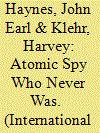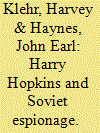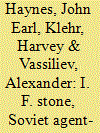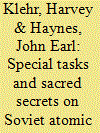|
|
|
Sort Order |
|
|
|
Items / Page
|
|
|
|
|
|
|
| Srl | Item |
| 1 |
ID:
186398


|
|
|
|
|
| Summary/Abstract |
In the late 1980s and early 1990s the KGB and its successor SVR began a campaign to claim a large share of credit for the USSR’s development of an atomic bomb. Memoirs by KGB officers celebrated their service’s success in penetrating the American “Manhattan” project. As part of this campaign, in 1991, Vladimir Chikov, a serving KGB (later SVR) officer, published an article in Russian and English, followed by a full-length book in French (1996), German (1996), and Russian (1997) on the exploits of an atomic superspy code named “Perseus,” said to still be alive and unknown to American security. “Perseus” was described as a senior physicist who was part of the Manhattan project from its origins, working first at the Chicago “Med” lab with Enrico Fermi and later at Los Alamos with Robert Oppenheimer. Veteran KGB officer Anatoly Yatskov, who had supervised several spies in the Manhattan project, added his endorsement of the “Perseus” story. For years, amateur and professional researchers used the clues in Chikov’s writings to search for the identity of “Perseus,” but no strong candidate emerged. With the opening of the Venona decryptions in 1995, most professional historians became convinced that “Perseus” was a KGB/SVR fiction, but “Perseus” lingers still with the wider public as a yet unidentified Soviet atomic spy. This article points to the internal contradictions and impossible assertions in Chikov’s “Perseus” story, as well as how Venona shows that Chikov took elements of the story of a real Soviet spy, Theodor Hall, to construct the “Perseus” myth. Hall was a junior scientist without an advanced degree who worked at Los Alamos in 1944 and 1945 (never at Chicago), but Chikov moved Hall’s story back to 1942 and elevated him from a junior figure to a senior scientist and associate of Fermi and Oppenheimer who, in Chikov’s words, gave Stalin “the Manhattan project on a serving plate.” Further, Chikov gave “Perseus” numerous attributes that precluded the still living Hall from ever being a candidate for the atomic spy “Perseus.”
|
|
|
|
|
|
|
|
|
|
|
|
|
|
|
|
| 2 |
ID:
134059


|
|
|
|
|
| Publication |
2014.
|
| Summary/Abstract |
One of the intriguing unidentified cover names in the Venona decryptions released in the mid-1990s was '19', a Soviet source senior enough to report taking part in a conversation with President Roosevelt, Prime Minister Churchill, and Vice-President Wallace at the 1943 Trident conference. While some historians thought the evidence too ambiguous to identify the real name behind '19', others built a case that it was presidential adviser Harry Hopkins. Alexander Vassiliev's notebooks, made public in 2009, resolved the issue by firmly identifying '19' as State Department official Laurence Duggan. There remain, however, writers who refuse to accept the evidence that '19' was Duggan and insist that Hopkins was a Soviet agent on the basis of insubstantial evidence.
|
|
|
|
|
|
|
|
|
|
|
|
|
|
|
|
| 3 |
ID:
087981


|
|
|
| 4 |
ID:
108623


|
|
|
|
|
| Publication |
2011.
|
| Summary/Abstract |
A careful review of the depiction of Soviet atomic espionage provided in Pavel Sudoplatov's Special Tasks and Sacred Secrets by Jerrold and Leona Schecter demonstrates how faulty memories, Soviet intelligence agency disinformation, sloppy citations, misplaced trust in documents provided by unidentified sources under unexplained circumstances, and egregious lapses in logic and judgment can lead to conclusions unsupported by evidence. The accounts of Soviet atomic espionage in both books are neither reliable nor credible. In particular, the assertions that Robert Oppenheimer, Enrico Fermi, and Leo Szilard consciously cooperated with and assisted Soviet atomic intelligence are without credibility.
|
|
|
|
|
|
|
|
|
|
|
|
|
|
|
|
|
|
|
|
|